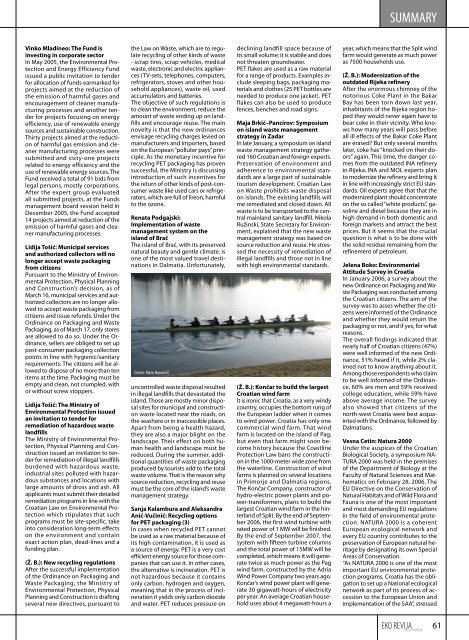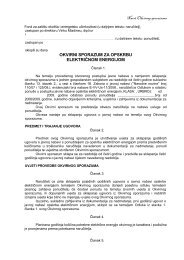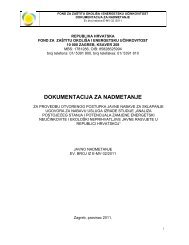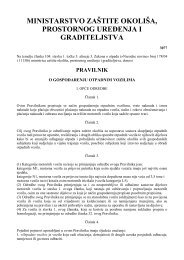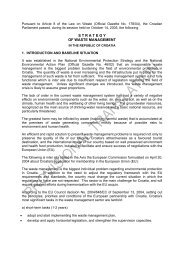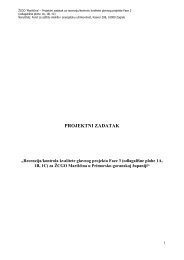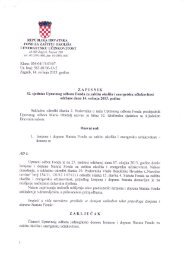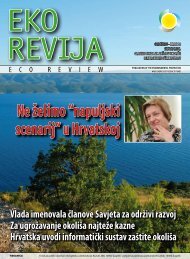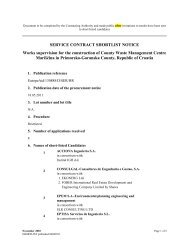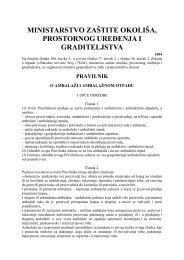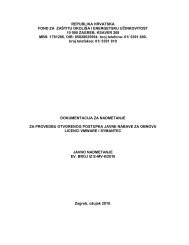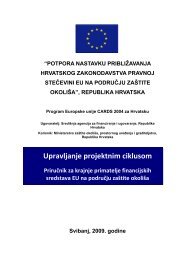• Voda život znači • Hrvatski pastirski pas tornjak - Fond za zaštitu ...
• Voda život znači • Hrvatski pastirski pas tornjak - Fond za zaštitu ...
• Voda život znači • Hrvatski pastirski pas tornjak - Fond za zaštitu ...
Create successful ePaper yourself
Turn your PDF publications into a flip-book with our unique Google optimized e-Paper software.
Vinko Mladineo: The Fund is<br />
investing in corporate sector<br />
In May 2005, the Environmental Protection<br />
and Energy Efficiency Fund<br />
issued a public invitation to tender<br />
for allocation of funds earmarked for<br />
projects aimed at the reduction of<br />
the emission of harmful gases and<br />
encouragement of cleaner manufacturing<br />
processes and another tender<br />
for projects focusing on energy<br />
efficiency, use of renewable energy<br />
sources and sustainable construction.<br />
Thirty projects aimed at the reduction<br />
of harmful gas emission and cleaner<br />
manufacturing processes were<br />
submitted and sixty-one projects<br />
related to energy efficiency and the<br />
use of renewable energy sources. The<br />
Fund received a total of 91 bids from<br />
legal persons, mostly corporations.<br />
After the expert group evaluated<br />
all submitted projects, at the Funds<br />
management board session held in<br />
December 2005, the Fund accepted<br />
14 projects aimed at reduction of the<br />
emission of harmful gases and cleaner<br />
manufacturing processes.<br />
Lidija Tošić: Municipal services<br />
and authorized collectors will no<br />
longer accept waste packaging<br />
from citizens<br />
Pursuant to the Ministry of Environmental<br />
Protection, Physical Planning<br />
and Construction’s decision, as of<br />
March 16, municipal services and authorized<br />
collectors are no longer allowed<br />
to accept waste packaging from<br />
citizens and issue refunds. Under the<br />
Ordinance on Packaging and Waste<br />
Packaging, as of March 17, only stores<br />
are allowed to do so. Under the Ordinance,<br />
sellers are obliged to set up<br />
post-consumer packaging collection<br />
points in line with hygienic/sanitary<br />
requirements. The citizens will be allowed<br />
to dispose of no more than ten<br />
items at the time. Packaging must be<br />
empty and clean, not crumpled, with<br />
or without screw stoppers.<br />
Lidija Tošić: The Ministry of<br />
Environmental Protection issued<br />
an invitation to tender for<br />
remediation of ha<strong>za</strong>rdous waste<br />
landfills<br />
The Ministry of Environmental Protection,<br />
Physical Planning and Construction<br />
issued an invitation to tender<br />
for remediation of illegal landfills<br />
burdened with ha<strong>za</strong>rdous waste,<br />
industrial sites polluted with ha<strong>za</strong>rdous<br />
substances and locations with<br />
large amounts of dross and ash. All<br />
applicants must submit their detailed<br />
remediation programs in line with the<br />
Croatian Law on Environmental Protection<br />
which stipulates that such<br />
programs must be site-specific, take<br />
into consideration long-term effects<br />
on the environment and contain<br />
exact action plan, dead-lines and a<br />
funding plan.<br />
(Ž. B.): New recycling regulations<br />
After the successful implementation<br />
of the Ordinance on Packaging and<br />
Waste Packaging, the Ministry of<br />
Environmental Protection, Physical<br />
Planning and Construction is drafting<br />
several new directives, pursuant to<br />
the Law on Waste, which are to regulate<br />
recycling of other kinds of waste<br />
- scrap tires, scrap vehicles, medical<br />
waste, electronic and electric appliances<br />
(TV-sets, telephones, computers,<br />
refrigerators, stoves and other household<br />
appliances), waste oil, used<br />
accumulators and batteries.<br />
The objective of such regulations is<br />
to clean the environment, reduce the<br />
amount of waste ending up on landfills<br />
and encourage reuse. The main<br />
novelty is that the new ordinances<br />
envisage recycling charges levied on<br />
manufacturers and importers, based<br />
on the European “polluter pays” principle.<br />
As the monetary incentive for<br />
recycling PET packaging has proven<br />
successful, the Ministry is discussing<br />
introduction of such incentives for<br />
the return of other kinds of post-consumer<br />
waste like used cars or refrigerators,<br />
which are full of Freon, harmful<br />
to the ozone.<br />
Renata Podgajski:<br />
Implementation of waste<br />
management system on the<br />
island of Brač<br />
The island of Brač, with its preserved<br />
natural beauty and gentle climate, is<br />
one of the most valued travel destinations<br />
in Dalmatia. Unfortunately,<br />
Snimio: Mario Đurasović<br />
uncontrolled waste disposal resulted<br />
in illegal landfills that devastated the<br />
island. Those are mostly minor disposal<br />
sites for municipal and construction<br />
waste located near the roads, on<br />
the seashore or in inaccessible places.<br />
Apart from being a health ha<strong>za</strong>rd,<br />
they are also a major blight on the<br />
landscape. Their effect on both human<br />
health and landscape must be<br />
reduced. During the summer, additional<br />
quantities of waste packaging<br />
produced by tourists add to the total<br />
waste volume. That is the reason why<br />
source reduction, recycling and reuse<br />
must be the core of the island’s waste<br />
management strategy.<br />
Sanja Kalambura and Aleksandra<br />
Anić-Vučinić: Recycling options<br />
for PET packaging (3)<br />
In cases when recycled PET cannot<br />
be used as a raw material because of<br />
its high contamination, it is used as<br />
a source of energy. PET is a very cost<br />
efficient energy source for those companies<br />
that can use it. In other cases,<br />
the alternative is incineration. PET is<br />
not ha<strong>za</strong>rdous because it contains<br />
only carbon, hydrogen and oxygen,<br />
meaning that in the process of incineration<br />
it yields only carbon dioxide<br />
and water. PET reduces pressure on<br />
declining landfill space because of<br />
its small volume; it is stabile and does<br />
not threaten groundwater.<br />
PET flakes are used as a raw material<br />
for a range of products. Examples include<br />
sleeping bags, packaging materials<br />
and clothes (25 PET bottles are<br />
needed to produce one jacket). PET<br />
flakes can also be used to produce<br />
fences, benches and road signs.<br />
Maja Brkić–Pancirov: Symposium<br />
on island waste management<br />
strategy in Zadar<br />
In late January, a symposium on island<br />
waste management strategy gathered<br />
160 Croatian and foreign experts.<br />
Preservation of environment and<br />
adherence to environmental standards<br />
are a large part of sustainable<br />
tourism development. Croatian Law<br />
on Waste prohibits waste disposal<br />
on islands. The existing landfills will<br />
me remediated and closed down. All<br />
waste is to be transported to the central<br />
mainland sanitary landfill. Nikola<br />
Ružinski, State Secretary for Environment,<br />
explained that the new waste<br />
management strategy was based on<br />
source reduction and reuse. He stressed<br />
the necessity of remediation of<br />
illegal landfills and those not in line<br />
with high environmental standards.<br />
(Ž. B.): Končar to build the largest<br />
Croatian wind farm<br />
It is ironic that Croatia, as a very windy<br />
country, occupies the bottom rung of<br />
the European ladder when it comes<br />
to wind power. Croatia has only one<br />
commercial wind farm. That wind<br />
farm is located on the island of Pag,<br />
but even that farm might soon become<br />
history because the Coastline<br />
Protection Law bans the construction<br />
in the 1000-meter wide zone from<br />
the waterline. Construction of wind<br />
farms is planned on several locations<br />
in Primorje and Dalmatia regions.<br />
The Končar Company, constructor of<br />
hydro-electric power plants and power-transformers,<br />
plans to build the<br />
largest Croatian wind farm in the hinterland<br />
of Split. By the end of September<br />
2006, the first wind turbine with<br />
rated power of 1 MW will be finished.<br />
By the end of September 2007, the<br />
system with fifteen turbine columns<br />
and the total power of 15MW will be<br />
completed, which means it will generate<br />
twice as much power as the Pag<br />
wind farm, constructed by the Adria<br />
Wind Power Company two years ago.<br />
Končar’s wind power plant will generate<br />
30 gigawatt-hours of electricity<br />
per year. An average Croatian household<br />
uses about 4 megawatt-hours a<br />
SUMMARY<br />
year, which means that the Split wind<br />
farm would generate as much power<br />
as 7500 households use.<br />
(Ž. B.): Moderni<strong>za</strong>tion of the<br />
outdated Rijeka refinery<br />
After the enormous chimney of the<br />
notorious Coke Plant in the Bakar<br />
Bay has been torn down last year,<br />
inhabitants of the Rijeka region hoped<br />
they would never again have to<br />
bear coke in their vicinity. Who knows<br />
how many years will <strong>pas</strong>s before<br />
all ill effects of the Bakar Coke Plant<br />
are erased? But only several months<br />
later, coke has “knocked on their doors”<br />
again. This time, the danger comes<br />
from the outdated INA refinery<br />
in Rijeka. INA and MOL experts plan<br />
to modernize the refinery and bring it<br />
in line with increasingly strict EU standards.<br />
Oil experts agree that that the<br />
modernized plant should concentrate<br />
on the so called “white products”, gasoline<br />
and diesel because they are in<br />
high demand in both domestic and<br />
foreign markets and attract the best<br />
prices. But it seems that the crucial<br />
question is what is to be done with<br />
the solid residue remaining from the<br />
refinement of petroleum.<br />
Jelena Boko: Environmental<br />
Attitude Survey in Croatia<br />
In January 2006, a survey about the<br />
new Ordinance on Packaging and Waste<br />
Packaging was conducted among<br />
the Croatian citizens. The aim of the<br />
survey was to asses whether the citizens<br />
were informed of the Ordinance<br />
and whether they would return the<br />
packaging or not, and if yes, for what<br />
reasons.<br />
The overall findings indicated that<br />
nearly half of Croatian citizens (47%)<br />
were well informed of the new Ordinance,<br />
51% heard if it, while 2% claimed<br />
not to know anything about it.<br />
Among those respondents who claim<br />
to be well informed of the Ordinance,<br />
60% are men and 59% received<br />
college education, while 59% have<br />
above average income. The survey<br />
also showed that citizens of the<br />
north-west Croatia were best acquainted<br />
with the Ordinance, followed by<br />
Dalmatians.<br />
Vesna Cetin: Natura 2000<br />
Under the auspices of the Croatian<br />
Biological Society, a symposium NA-<br />
TURA 2000 was held in the premises<br />
of the Department of Biology at the<br />
Faculty of Natural Sciences and Mathematics<br />
on February 28, 2006. The<br />
EU Directive on the Conservation of<br />
Natural Habitats and of Wild Flora and<br />
Fauna is one of the most important<br />
and most demanding EU regulations<br />
in the field of environmental protection.<br />
NATURA 2000 is a coherent<br />
European ecological network and<br />
every EU country contributes to the<br />
preservation of European natural heritage<br />
by designating its own Special<br />
Areas of Conservation.<br />
“As NATURA 2000 is one of the most<br />
important EU environmental protection<br />
programs, Croatia has the obligation<br />
to set up a National ecological<br />
network as part of its process of accession<br />
to the European Union and<br />
implementation of the SAA”, stressed<br />
EKO REVIJA eco review<br />
61


